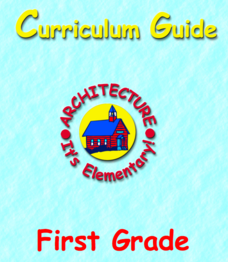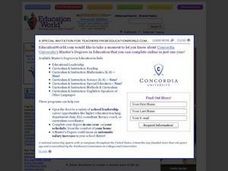American Museum of Natural History
Create a Compass
Historically, humans have used many methods of finding due north. Using a hands-on activity, learners create their own compasses. They then test their compasses in their neighborhood or to assist with stargazing.
American Institute of Architects
Architecture: It's Elementary!—First Grade
Build an interest and appreciation for architecture in your young learners with this fun 10-lesson art unit. Engaging children in using their five senses, the class first observes the environment around them, paying...
Sargent Art
Rainforest Mural
Whether you are an art teacher or a teacher looking for a great project to finish off a unit on the rainforest, this instructional activity is for you. Here are some great teaching tips and instructional practices that can help you and...
Curated OER
Mixed Media Ocean Art
Students design pictures of ocean environments. In this art lesson, students use mixed media art materials to develop a picture that depicts the ocean environment. They use paint, sand paper and various basic art materials.
Curated OER
Kirigami: The Ancient Art of Paper Cutting
Young scholars perform inquiry into the ancient art of Kirigami. The research provides a context for the activity and how it is related to History. Students also appreciate the art for the sake of its contribution to culture.
August House
Go to Sleep, Gecko
Use this multidisciplinary lesson to delve into these subjects: English language arts, math, science, drama, and character education. After reading, discussing, and making interpretations about Go To Sleep, Gecko!: A Balinese...
Curated OER
Soft Sculpture Birds
Art can mimic life, and animals are always interesting subjects. Learners create large soft sculptures (stuffed) birds using paper, paint, and other basic collage materials. They view images of birds, and discuss bird traits and shapes....
Curated OER
Cotton Swab Skeletons
To truly teach through the arts means one must tackle both art and core content in one lesson. This quick activity does just that. Learners make skeletons out of cotton swabs in order to study relief sculpture and the skeletal system....
King County
Reproductive System
It's every health and science teacher's favorite subject to cover: the reproductive system. This comprehensive lesson introduces adolescents to the reproductive anatomy of men and women with the help of a series of diagrams,...
Curated OER
Stained Glass Flowers
Elementary and middle schoolers create decorative flowers using wire armatures and a special paint that remains flexible when it dries. The results from this project are stunning, but the materials needed may be tough to track down. An...
Michigan State University
Create an Animal
Think beyond the animals and habitats we've already discovered and allow scholars to dream up their very own habitat and an animal that lives there. Class members present the new habitat and animal on a poster alongside an...
Dick Blick Art Materials
Matisse Prints du Soleil
The sun provides the link between this art and science activity. Kids use sunlight (or light from an artificial source) to produce heliographic prints on fabric or paper.
Curated OER
Tomato Exploration
Create tomatoes in 15-20 minutes using this fun and interactive lesson plan! Learners listen to a book about tomatoes (recommendations listed), and focus on the vocabulary word tomato. They count the syllables...
Curated OER
Ocean Exploration: Shapes and Patterns Under the Sea
So many shapes in our vast oceans. Young explorers can discover new shapes in a variety of ways in this lesson. One way is having free exploration with a pattern shape kit handed out by the teacher. Another is by viewing a...
Curated OER
Dragonfly Sculptures
Art projects are great when they apply to other subjects. First study insects, their parts, and their habitats. Then have little ones create a dragonfly. They use clothes pins, raffia, pipe-cleaners, and paint to construct their...
Curated OER
Ocean Poster
Students discover ocean life by creating a mural. In this ocean biology lesson, students utilize a computer to find images of the ocean that can be used to create a collage. Students discuss the different images and how the...
Curated OER
Genetics: Integrated with History and Art
Students work cooperatively in pairing chromosomes, created statistical genetic babies using the face lab, constructed a color DNA booklet and demonstrated mitosis in a flip book.
Curated OER
Autumn Colors Shine Through
Students create colorful stained-glass Autumn window decorations. They shave crayons with scissors, melt the crayons in wax paper with an iron, and cut out a leaf pattern to display on windows.
Scholastic
Lesson Four: The Earth, Layers of Earth
Get your hands dirty with a set of earth science activities! Class members delve into a hard-boiled egg to find the similarities to the earth's layers, create a papier-mâché model of the earth, craft a simulation of the earth's...
Curated OER
My Planet Earth
The earth is a delicate and fragile thing; Why not engage your class in a craft project that will make them aware of our environment? Earth Day is celebrated as recycled materials are used to create earth window hangings. Crayons are...
DiscoverE
Marble Run
It's time to slow your roll! Can your class create a track that allows a marble to roll as slowly as possible? Teams of science scholars collaborate to design, build, and test their tubes while learning about gravity and friction.
Energy for Keeps
Going for a Spin: Making a Model Steam Turbine
Discover the effectiveness of wind, water, and steam as energy sources. The hands-on activity has young scientists create a turbine from common materials. After constructing the turbines, they use wind, water, and steam to turn them and...
Energy for Keeps
The Energy Times
Extra! Extra! Read all about past and present energy use in a classroom-made historical newspaper. Useful as a cross-curricular assignment between science, history, and language arts, the project is sure to get young journalists...
Hawaiʻi State Department of Education
Machines
What do science and dance have in common? Simple machines, work, and force! First, children discuss machines, wheels, inclined planes, and wedges. They create inclined planes with their bodies and make up dances about wheels and wedges....

























